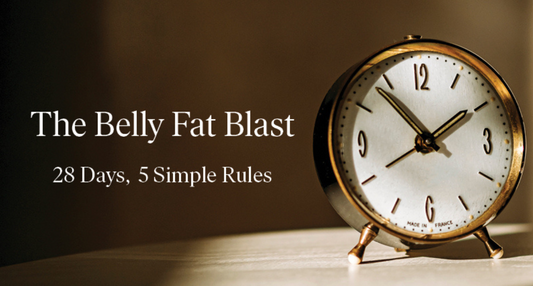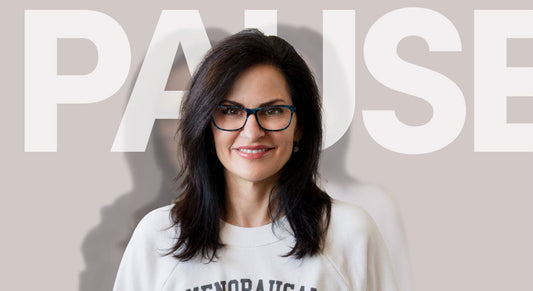Menopausal Hormone Therapy (MHT) After Age 60

Share
For years, women have been told that once you pass age 60 or hit the 10-year mark after menopause, hormone therapy is no longer an option. But the science has evolved—and the latest research tells us this blanket rule just doesn’t hold up. Let’s break it down and review some options available to you if hormones aren’t the right fit for you.
Is MHT After 60 Safe?
The North American Menopause Society (NAMS) makes it clear: There is no mandatory age to stop MHT. For healthy women with persistent symptoms, the decision to take MHT after 60 should be individualized—based on your PERSONAL health profile and risk factors. There is no “one-size-fits-all” answer.(1)
And now, thanks to a 2024 study examining over 10 million Medicare beneficiaries aged 65 and older, we have even more data to guide these decisions.(2)
Benefits of MHT After Age 60: Beyond Symptom Relief
We’ve long known that MHT offers relief from hot flashes, night sweats, joint pain, and sleep disturbances…just to name a few. But for women on estrogen therapy (ET) after 65, the benefits go even further. According to the latest research, ET was associated with:
- 19% lower risk of all-cause mortality
- 16% lower risk of breast cancer
- 13% lower risk of lung cancer
- 12% lower risk of colorectal cancer
- 5% lower risk of congestive heart failure
- 3% lower risk of venous thromboembolism
- 4% lower risk of atrial fibrillation
- 11% lower risk of heart attack
- 2% lower risk of dementia(2)
Keep in mind that not all estrogens are the same. These benefits were strongest in women using estradiol (E2)—the bioidentical form of estrogen most similar to what your body makes naturally—and especially when delivered via transdermal patch or vaginal estrogen, rather than oral pills.(2)
What About Combination Therapy (Estrogen + Progestogen)?
If you still have your uterus, you need both estrogen and a progestogen (either synthetic progestin or bioidentical progesterone) to protect your uterine lining. Combination therapy (estrogen + progestogen) does come with a slight increase in breast cancer risk—ranging from 10% to 19%, depending on the formulation and route.(2)
The good news? This risk can be substantially reduced if you:
- Use low doses
- Choose transdermal or vaginal delivery instead of oral pills
- Opt for estradiol (E2) over conjugated equine estrogens (CEE)(2)
Interestingly, some forms of combination therapy—especially low-dose transdermal estrogen + progestin—were even linked to:
- 45% lower risk of endometrial cancer
- 21% lower risk of ovarian cancer
- 5% lower risk of ischemic heart disease
- 5% lower risk of congestive heart failure
- 5% lower risk of venous thromboembolism(2)
What If MHT Isn’t Right for You?
If you have a history of hormone-sensitive cancer, existing cardiovascular disease, or you simply prefer nonhormonal options, there are effective alternatives supported by the latest evidence.
Genitourinary Syndrome of Menopause (GSM)
For vaginal dryness, pain with intercourse, or recurrent UTIs, vaginal estrogen is safe and effective for most women, including those with a history of breast cancer.(3) Other helpful options include:
- Vaginal moisturizers to maintain hydration (used regularly, not just before sex)
- Lubricants to ease discomfort during intercourse
- DHEA vaginal suppositories or oral ospemifene, both non-estrogen therapies approved for GSM(3)
If you’re looking for a deep dive into GSM—including how to recognize the symptoms and explore the latest treatment options—I have an entire blog dedicated to the topic: Navigating Genitourinary Syndrome of Menopause.
Nonhormonal Options for Hot Flashes
The 2023 Nonhormone Therapy Position Statement from NAMS outlines several nonhormonal treatments that have solid evidence for reducing vasomotor symptoms (VMS) like hot flashes and night sweats:
- Cognitive behavioral therapy (CBT) and clinical hypnosis
- Prescription options: SSRIs, SNRIs, gabapentin, oxybutynin, and the new drug fezolinetant
- Weight loss (if appropriate) and stellate ganglion block (a nerve block procedure)
The evidence does not support things like paced breathing, herbal remedies, or acupuncture as effective treatments for hot flashes.(4)
Lifestyle and Nutrition Tweaks
- Stay active—regular exercise supports heart health, bone strength, and mood.
- Eat a diet rich in whole foods, omega-3s, and plant-based phytoestrogens (like flaxseed and soy).
- Stay hydrated and limit alcohol and caffeine, which can trigger hot flashes.
The Bottom Line
If you are over 60 and struggling with menopause symptoms, it’s time to let go of the outdated belief that MHT is off-limits.(5) For many women, the benefits of low-dose, transdermal estrogen (with or without a progestogen) can outweigh the risks—even decades after menopause.
For others, nonhormonal therapies offer effective alternatives. The key is working with a knowledgeable menopause specialist to tailor your treatment to your individual health history and goals.
To learn more, check out my book, The New Menopause and download my Menopause Empowerment Guide
























